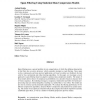Free Online Productivity Tools
i2Speak
i2Symbol
i2OCR
iTex2Img
iWeb2Print
iWeb2Shot
i2Type
iPdf2Split
iPdf2Merge
i2Bopomofo
i2Arabic
i2Style
i2Image
i2PDF
iLatex2Rtf
Sci2ools
105
click to vote
JMLR
2006
2006
Spam Filtering Using Statistical Data Compression Models
Spam filtering poses a special problem in text categorization, of which the defining characteristic is that filters face an active adversary, which constantly attempts to evade filtering. Since spam evolves continuously and most practical applications are based on online user feedback, the task calls for fast, incremental and robust learning algorithms. In this paper, we investigate a novel approach to spam filtering based on adaptive statistical data compression models. The nature of these models allows them to be employed as probabilistic text classifiers based on character-level or binary sequences. By modeling messages as sequences, tokenization and other error-prone preprocessing steps are omitted altogether, resulting in a method that is very robust. The models are also fast to construct and incrementally updateable. We evaluate the filtering performance of two different compression algorithms; dynamic Markov compression and prediction by partial matching. The results of our emp...
Related Content
| Added | 13 Dec 2010 |
| Updated | 13 Dec 2010 |
| Type | Journal |
| Year | 2006 |
| Where | JMLR |
| Authors | Andrej Bratko, Gordon V. Cormack, Bogdan Filipic, Thomas R. Lynam, Blaz Zupan |
Comments (0)

